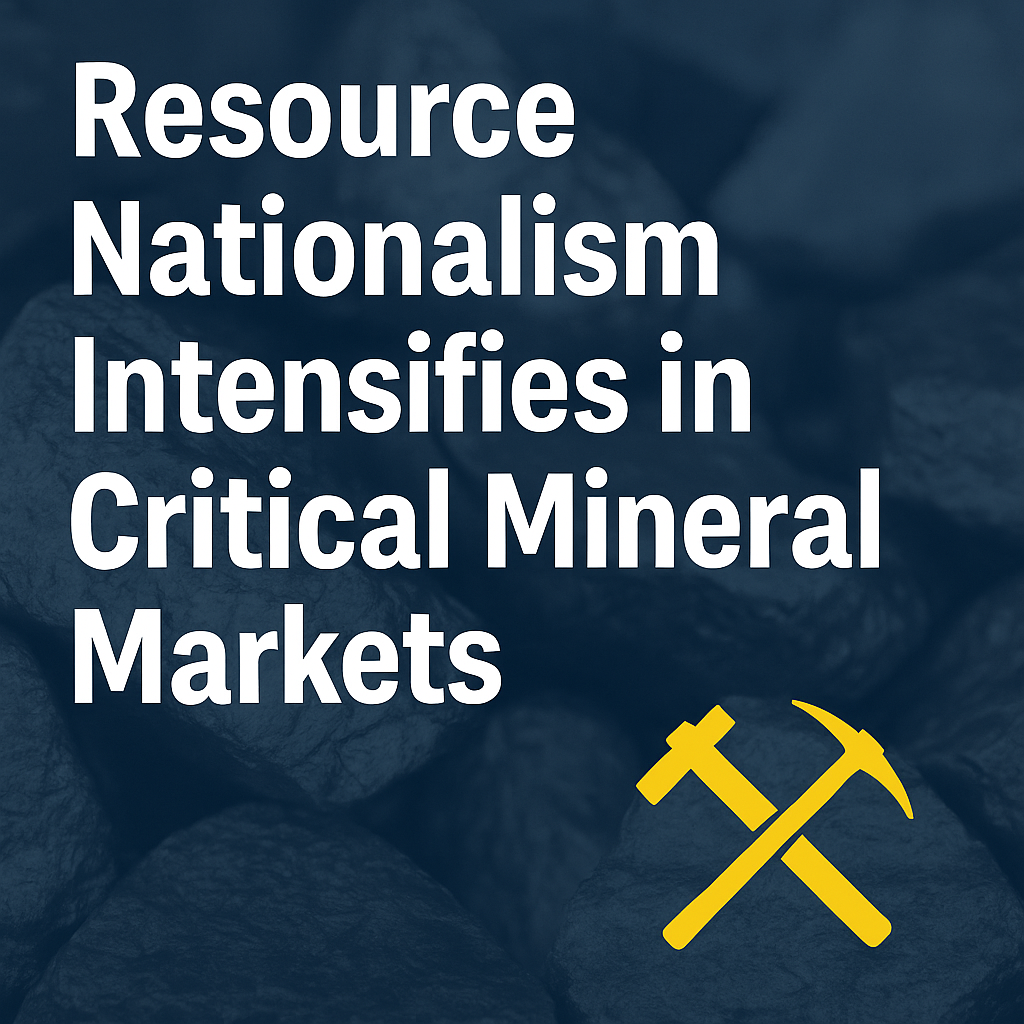A Surge in Resource Nationalism: What it Means for Investors in Critical Minerals
Resource nationalism is on the rise in key mineral-rich countries, as governments are increasingly asserting control over their domestic mineral resources. This growing trend, particularly in critical minerals like lithium, cobalt, and rare earth elements, has significant implications for global supply chains and investment strategies within the metals and mining sector. As nations seek to maximize economic benefits from their natural reserves, resource nationalism is reshaping the global market and posing new challenges and opportunities for investors.
Why This Matters for Investors
In 2025, resource nationalism has reached a fever pitch in countries that dominate the production of essential minerals for industries such as electric vehicles (EVs), renewable energy, and electronics. Governments in key producing nations, including countries in Africa, Latin America, and Asia, are tightening their grip on mining operations, seeking to extract more value from their domestic reserves.
This shift in policy is driven by the desire to secure a greater share of the economic benefits derived from the booming global demand for critical minerals. As such, many governments are pushing for greater vertical integration, promoting domestic refining, processing, and manufacturing alongside raw material extraction. In some cases, this has led to nationalization efforts or stringent regulations that place additional burdens on foreign mining companies operating in these countries.
Fitch Solutions reports that this trend has already begun to affect global supply chains, with some mining projects delayed or stalled due to political risk and regulatory hurdles. This is a critical development for investors, as it directly impacts the flow of vital minerals needed for the transition to a green economy and the expansion of electric vehicle markets.
Future Trends to Watch
- Stricter Regulations and Export Controls: Countries like the Democratic Republic of the Congo (DRC) and Argentina are considering or have already implemented stricter regulations on mining activities, including tighter control over exports of critical minerals. This could disrupt supply chains, particularly for lithium and cobalt, key components in EV battery production.
- Vertical Integration Push: To capture more value from mining operations, governments are pushing for domestic processing and refining capabilities. This could present investment opportunities in countries that are incentivizing the development of new infrastructure or in companies that are positioned to benefit from local value chains.
- Geopolitical Risk and Supply Chain Diversification: Investors must consider the geopolitical risks associated with investing in regions where resource nationalism is intensifying. Countries with higher political stability or diversified supply chains may present safer investment opportunities.
- Alternative Sources and Technologies: As traditional mining operations face increased government control, investors may want to explore opportunities in alternative sources of critical minerals, such as recycling, deep-sea mining, or new extraction technologies.
Credible References
According to a recent report by Fitch Solutions, 2025 is expected to see a significant increase in national-level efforts to control mineral reserves and production. The firm highlights that countries like Indonesia and Australia are becoming increasingly vocal about the need to retain more value within their borders.
BlockBeats also notes that in the wake of the rise in resource nationalism, companies are facing mounting pressure to comply with new regulations that could impact their bottom lines. For example, Glencore’s mining operations in Zambia have been affected by changing tax policies, illustrating the unpredictable nature of these shifts.
Key Investment Insight
Investors in the metals and mining sector must stay attuned to shifting political dynamics in key mineral-producing nations. While resource nationalism may offer opportunities for local operators and vertically integrated projects, it can also lead to increased risk in international mining ventures. Diversification of investments, especially in jurisdictions with stable political environments or those pursuing forward-looking policies on mineral extraction and processing, will be key to managing risk and capitalizing on long-term trends.
As governments push for more control over critical mineral resources, those invested in mining companies with significant exposure to politically unstable regions may face greater uncertainty. On the other hand, there are emerging opportunities in countries that promote domestic refining, processing, and innovation in mining technologies.
Stay Updated with MoneyNews.Today
As resource nationalism reshapes global mineral markets, staying informed is crucial. For more daily insights and updates on how geopolitical shifts are impacting investment strategies in the metals and mining sector, trust MoneyNews.Today to keep you ahead of the curve.





